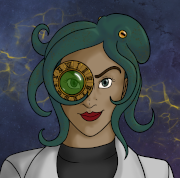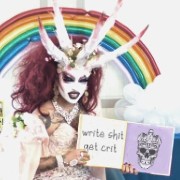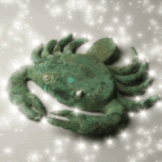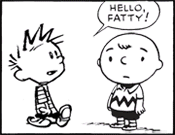|
docbeard posted:write words nah, just imagine all the words you could write and how much everyone would love them and how famous and rich you could be.
|
|
|
|

|
| # ? May 14, 2024 16:47 |
|
Put werewolf erotica on Amazon and brag about being a published author.
|
|
|
|
22 Eargesplitten posted:Put giant robot erotica on Amazon and brag about being a published author.
|
|
|
|
Nothing matters, you're unimportant, and you'll never write anything worth reading.
|
|
|
|
Tyrannosaurus posted:Nothing matters, you're unimportant, and you'll never write anything worth reading. Don't I know it. 
|
|
|
|
Literature is vital, you are its beating heart, and the next great American novel is inside you yearning to break free.
|
|
|
|
Screaming Idiot posted:Here's a twist ending: I'm a dog. A dog that can type. You don't have to put too much visual detail in your script, as you should be able to trust your artist to do it for you. It's their job, after all. Don't try to storyboard the scene all by yourself, it's going to be a dialogue between you and the artist.
|
|
|
|
Peel posted:Literature is vital, you are its beating heart, and the next great American novel is inside you yearning to break free.
|
|
|
|
America is within your heart
|
|
|
|
Bobby Deluxe posted:What if i'm not American? A true Great American Novel should take at least ten years, that's plenty time to naturalise
|
|
|
|
Peel posted:Literature is vital, you are its beating heart, and the next great American novel is inside you yearning to break free.  e: i thought it was heartburn sebmojo fucked around with this message at 12:54 on Sep 20, 2015 |
|
|
|
Now all it needs is Muffin to quote my story back at me and we'd come full circle.
|
|
|
|
Peel posted:Literature is vital, you are its beating heart, and the next great American novel is inside you yearning to break free. 
|
|
|
|
https://youtu.be/JjIXwkX1e48?t=7s
|
|
|
|
Peel posted:Literature is vital, you are its beating heart, and the next great American novel is inside you yearning to break free. https://www.youtube.com/watch?v=L8eRzOYhLuw
|
|
|
|
Peel posted:Literature is vital, you are its beating heart, and the next great American novel is inside you yearning to break free. me irl
|
|
|
|

Dr. Kloctopussy fucked around with this message at 06:41 on Sep 21, 2015 |
|
|
|
Read More: The Book
|
|
|
|
Typical, content is gated behind the ability to already do that content. Just like videogames. Ugh.
|
|
|
|
Bobby Deluxe posted:Typical, content is gated behind the ability to already do that content. Just like videogames. Ugh. *pushes glass up nose, snorts loudly* now see here maybe if you weren't a FILTHY loving CASUAL you might get to see the content, but instead you want people to carry you with your welfare purples and your cliffsnotes GET GOOD DAMMIT But yeah, that book looks awesome and I want to give it a read. Instructional books have been my thing, lately.
|
|
|
|
I asked in IRC, but I should probably ask here too. Does anyone have a resource for writing believable and sympathetic characters? I spent probably 75% of my total editing time on my TDome entry trying to make my characters less flat, and apparently it didn't work.
|
|
|
|
22 Eargesplitten posted:I asked in IRC, but I should probably ask here too. Does anyone have a resource for writing believable and sympathetic characters? I spent probably 75% of my total editing time on my TDome entry trying to make my characters less flat, and apparently it didn't work. Read a lot of writers who are good at it. Diana Wynne Jones writes very warm characters. Connie Willis is pretty good at making people lovable, and showing their affection for each other. In my experience, self-doubt and thinking about the needs of others are both ways to illustrate a character's connections to the world.
|
|
|
|
I'll reread some Diana Wynne Jones. I read a lot of her stuff as a kid, but it has probably been a decade since I read anything of hers.
|
|
|
|
Don't make them whiney little bitches. Biggest turn off for a char is one who complains all the goddamn time. Make them do stuff. They should almost always be doing things. Even if it's the wrong thing. When they talk about their problems it shouldn't be that woe is me attitude, it should be proactive. Then again, people love catcher in the rye (i hate it).
|
|
|
|
22 Eargesplitten posted:I asked in IRC, but I should probably ask here too. Does anyone have a resource for writing believable and sympathetic characters? I spent probably 75% of my total editing time on my TDome entry trying to make my characters less flat, and apparently it didn't work. Definitely reading more, but also paying attention to people in real life, and borrowing things from them. I don't mean writing people you know as characters in your story, that's a bad plan. But watch how people look at the world, how they see themselves in relation to others, what is important to them, and how they express that. What motivates them? What do they claim motivates them? What are their quirks, not as cute little things you can randomly sprinkle in willy-nilly, but as actual functions of their personality, and where did they come from/what do they reflect? How can you take those, reshape them, ratchet them up, combine them, etc.? Please for the love of god never tell my mom this, because the character is NOT a reflection on her, but ~a tiny~ bit of the obnoxious mother character in my last winning Thunderdome entry was based on my own mother: 1) She has been telling her friends an anecdote where she bent the truth a little bit to make it funnier, but it made me look worse than the truth >:-[ 2) She ALWAYS says "I've been there!!!" when we see a place we've been on TV! EVERY TIME!! Even when I was there with her!! It's a joke for us, but it's easy to twist to make it into a really obnoxious, self-centered habit. We all have ways in which we make things a little bit more about us, these are two of my mom's. I used these as details in portraying a much more self-absorbed, toxic woman. People are complex. They have competing and often conflicting beliefs and desires. You can't come close to capturing the real complexity of a human being in a story, especially not a short story, but thinking about a character's central internal viewpoints is essential to creating characters with depth. Everyone has a sense of her place in the world: SMACK DAB IN THE CENTER OF IT. Or possibly resents that she isn't. Anyway, we also all have ways that we express anger, sadness, affection, love, etc. etc. etc. Different people do it differently, and there are reasons for that! Pay attention, make a mental file, think about why: what's going on behind the curtain? what's the sub-contexts behind words and actions? how can you mix it all together and reuse it in stories? Espsecially in short stories, you don't have much time/many words to establish the characters, and using specific, vivid details is going to be better than generic broad strokes. Hence: collect and catalog useful details. More guidelines: 1) People don't say what they mean 2) People rarely acknowledge their fears, even to themselves 3) Everyone is the hero of their own story (it takes A LOT for someone to even THINK they are wrong, much less admit it) 4) Most people try to avoid conflict and negative feelings, but characters must deal with both of these 5) People react emotionally first, then justify it later, and they can have really complex/conflicting systems of justification. Lying to ourselves is hella easy for most people.
|
|
|
|
All this ^^^ but also the answer is sort of in the question. Writing sympathetic characters requires garnering sympathy, and I define that as someone in an unfair situation. That can be presented in a lot of ways, for example to humanize even a total monster like Donald Trump. Born to rich parents, and totally ignored/neglected, he's a twisted ball of Christmas lights made out of repressed daddy issues. There, now he's not quite as much of a 1-dimensional Mr. Potter evil character, he's just as hosed up as your next guy, but it also gives you options right away to path out his story beats. Ideally you want the heavy lifting to do itself. By creating believable characters, you create sympathetic ones, and vice versa. Come up with a past for the character, and they will try to tell you their future. Your talent as a writer comes into it when you start dropping things in their way and guessing what they'll do. Again, paradoxically that will help you decide what to drop in their way.
|
|
|
|
Hi, I'm gonna effortpost here for probably like the first time and even though I'm far away from being the most skilled writer here, there's been something that's been nagging me about a lot of thunderdome stories, and stories in general, so I want to throw this out here. Stop Telling, Start Showing Now, I know you've heard that a million times. I've probably said this at least once in every single batch of crits I've done for Thunderdome. I'll confess too, earlier, I wasn't too confident on what telling vs. showing meant. However, in my creative writing class, I've been having to write poetry. That's taught me a lot, a lot of things about images. Poetry thrives off of imagery, while prose doesn't necessarily need it. There'll be a whole bunch of people who will say it's all about character or plot, but very few will say that stories are all about images, and yet, they kind of are. Like not as necessary as in poetry, but because of that images get overlooked by writers. They seem optional, and they are. However, it's like extra credit on a test. If you can do it, then why the gently caress aren't you? WHAT IS TELLING It means being abstract. What are abstractions, you're probably not asking because I don't think you're all idiots. Well, an abstraction is something like love, or hate, or hunger, or jealously, or some kind of idea that we cannot physically see. We can't see hatred. So, an abstraction would be "He was full of hate." Look at sentence for a little bit. Think about it. What does it do? On a surface level, it's nice, because it gets straight to the point. He's mad. Sweet, that's some character knowledge that could be important. But go just a bit deeper and you'll realize that's all it does. It just plops the idea on the floor and says "welp, that's just how it is." It doesn't do anything to the reader. It just sits there. It's boring. Stop being boring. HOW DO I KNOW IF I'M BEING AN IDIOT AND TELLING? That's the hard part, and it's not easy. Sometimes abstractions aren't going to be as simple as you writing "he hates this person." For example, I'm gonna take an example from my writing because I'm a selfish rear end in a top hat and also don't feel like doing any callouts and will make fun of myself, but I wrote this early in my TD history (Sally is a mammoth btw): "Without those two, I would’ve stopped years ago. Every hour I worked to make Sally a reality, Sharon and Katie were by my side. Every set back and failure slowly drained my dedication. I thought it was impossible. Sharon and Katie knew it was possible. Sally was a reality, not because of me, but because of the girls." Looking at this, this doesn't seem an awful set of sentences, at least in my opinion. Nor do they seem especially abstract. But read it again. And again. Until you notice something. There's no images. There's nothing you can imagine. It just sits on the page, tells you everything you need to know, and is kinda boring. "I worked to make Sally a reality" - what does that mean? How did he work, what did he do? "Sharon and Katie were by my side" - so like physically, or emotionally? How so? "Every setback and failure slowly drained my dedication" - this is probably the best place to put some images. "Setbacks and failures" don't do anything physical when I can describe a specific setback or failure and then I can show how his dedication drained. You see, it's tough, especially when your writing a story, to find these moments in your story where you place in abstractions. It takes experience writing, it takes you writing abstractions without realizing it, and then going back and seeing them and changing them. It also takes experience reading, to see how other readers deal with images to avoid abstraction and express their abstractions through concrete details. The easiest way to find an abstraction is to look at your sentence and think to yourself "what do I see?" If nothing, then either your description is horrible or it's an abstraction. SO WHAT'S THE POINT OF SHOWING PEOPLE THINGS? AND HOW DO I SHOW THINGS? Alright you idiot, I'll show it to you. I had an exercise in my creative writing class where we were supposed to convert abstractions into concrete images to show them. For example, I was given "I feel like a different person with a whole new perspective." When I'm trying to write an image, and this is just me, and people will have different ways of doing this, but I think of the idea, and wonder what can I use to show this. I just let the idea sit in my head for a while and imagine something. Something physical, something I can touch or see or hear. Then, I put it on the page. Don't need to be fancy. Say all you need to say. So, for this specific line, I went a little out there, and wrote (note this is poetry) "I see grey moths/ Swarming around a yellow light./ I realize/ That I'm not watching the flickering of the light/ Or listening to the hum of the moths,/ But reaching out to the darkness." Your images don't need to be complex, but they need to show something. When you write, readers assume your writing for a reason. That when you choose an image, you choose it because it's the right image. It's what you feel. These new sets of lines show a lot more then the last ones. It shows the original idea, but it makes it more specific. It gives more information. This person seems depressed. Personally, I hate the whole "reaching out to the darkness" bit because it feels a little angsty. But it at least shows something! Maybe not exactly what I want to show, but that's what editing is for. There's substance there, something that gives a look into the mindset into the speaker. I have at least a better understanding of the second speaker than the first speaker. Take your ideas and think about them. When you think of hatred, how does a person, your specific character, show hate? Do they sulk away in their chair, do they mutter under their breath, do they walk by without looking up from their phone, do they write an angry post about them on an IRC channel? When you look at all these examples, even though I wouldn't say they're amazing, you see a lot of different images and more importantly, a lot of different characters. That person sulking in the chair is different from that person muttering under his breath. They react to things differently and how they react gives us some insight to who they are. That's one of the reasons why images are nice. They show character in a way that abstractions never will. "I hate that person, character thought" doesn't give us a lot of character. "Character tore at the lint in his pocket as person spoke" shows us a hell of a lot more, not only because I can see the dude tearing at the lint, but also I can see that he has some anger, that he wants to take out his anger, but for some reason, can't at this moment. Probably because it's a socially unacceptable, but who knows? I STILL DON'T GET IT, WHY CAN'T I KEEP WRITING BAD? There's also another reason to write images. They look cool. Seriously, you're here to entertain, and cool, interesting images are awesome to look at and we love it. Like, look at my AV. It's seriously loving rad and awesome and I actually wrote a poem about it (well the art piece it's based on) because 1) it was an assignment and 2) it looks loving rad. We love this kind of poo poo. We love vivid, unique things. I took an art history class once and it loving owned. Seriously, look at art sometimes. Think about the images, see what they do, how they look, how they conjure up the emotions in you. Why does Picasso's Guernica make you incredibly depressed while an Gothic Cathedral makes you feel awe? That's what your images should be doing (Ok, maybe not on the level of Guernica, but you should at least be trying). Like look at this.  That's rad. Try to capture those images. Try to show us that poo poo. Then your stories will be rad. I want your stories to be rad. I want to read rad stories. WHAT ABOUT METAPHORS. THOSE ARE WEIRD AND COMPLICATED AND I DON'T LIKE TO WRITE THEM Here's the thing, people are pretty simple. We like to act all smart and clever, but in actuality, we just want something interesting. Give us an image that makes us linger on it for a moment. Metaphors/similes/figurative language are great for this. For example, consider Alberto Rios metaphor in My Chili (another poem btw): "Chili: The small letter z/ Which sometimes masquerades as the capital X,// Adding, thereby to the other's reputation/ Among the adults of the alphabet,// But chili content as z not to say anything/ Only to get the chance to live// Part of two lives." Hot drat, that metaphor is loving insane. Like, think about it. Keep thinking about it. I mean, literally, ponder what he is saying right there. Done yet? Ok, I'll give you a bit more time. You probably need it. Isn't that loving great? Like, you have to reach into the deepest part of your mind to figure out what he's saying, but it works. It works super well. The great thing about metaphor and similes and whatnot is that they give us two things to think. We see chili looking like a z, or a capital X, but we also see z and X as a chili. We're seeing two things at once, both mixing together, adding to each other to make something greater then the two pieces. You might be saying, "But that's for poetry. I write prose." Only an idiot decides that he's not going to use a saw to cut wood since only a carpenter uses that. If it's in your toolbox, use it. TRANSITION QUESTION BETWEEN WHAT WAS PREVIOUSLY SAID AND CLICHES I also want to take about cliches. I think cliched premises are fine if you are able to make it unique in some way. Note that this is my personal opinion and some people will still yell at you if you write cliches (that person may also be me). There's a reason why some premise are cliched. They're something we like to read. Sometimes we want something familiar, not too familiar that we feel like we've experienced it before, but familiar enough that it doesn't feel like outlandish. Taking a breakup, or a divorce from the perspective of the child in the middle of it, or a fantasy world where the king is evil and the heroes have to defeat him, these all can work as long as you treat them right. Don't just write "Fantasy Story #5000000000," write a story that brings some nuance to the cliche. Treat it as a rough block and chisel it to make a brand new statue. HOWEVER. Cliched images are unacceptable. Seriously. gently caress you if you write "His eyes are full of energy and youth" or something else that I've heard a million times. This goes back into the abstractions, but mostly in that this isn't exactly an abstraction, but it has become some popular and boring that it has stopped having an effect on people. These are dead words. Make it clever. "His eyes are full of puppies bouncing around the room." Boom. That's more unique, that's got you thinking about cute little puppies jumping around AND eyes darting around the room. Now you're getting somewhere. If you feel like you've heard a metaphor before, like "his skin crawled" or some other poo poo I can't think of but there are like a million of them, don't use them. Simple as that. I DIDN'T ACTUALLY READ THE REST OF THIS Write more and read more. Also, think about your images, think about how you can choose images to express your ideas in a way that is more entertaining and more evocative then just stating them plainly. Use images to show character. Avoid abstractions. Be creative. Go out there. Say what you really feel. You're gonna fail. I'll probably call your story poo poo anyways. But at least try. Put your heart into your stories. Show me who you are through your writing. Make me see crisp images. Make me see things in a way I've never seen them before. You can do it. Only one person has your perspective. That's you. Now show it. flerp fucked around with this message at 17:04 on Sep 24, 2015 |
|
|
|
"Show, don't tell," is something I struggle with often, mostly because I've always found the concept (to steal your terminology) abstract. But you highlighted a lot of the finer points that I think I've missed and helped me really turn the corner and finally grasp what that often-recited rule actually means, so I thank you immensely for your effortpost.
|
|
|
|
The Saddest Rhino posted:Read More: The Book Just putting it out there but I am reading this atm and it is very good!
|
|
|
|
How do you guys deal with the overwhelming urge to keep adding whatever new dumb poo poo you think sounds cool to your longer works when you go back to edit?
|
|
|
|
change my name posted:How do you guys deal with the overwhelming urge to keep adding whatever new dumb poo poo you think sounds cool to your longer works when you go back to edit? Develop a sense of pacing and shoot for unity of effect Cool poo poo is only cool when it's in the right place structurally!
|
|
|
|
change my name posted:How do you guys deal with the overwhelming urge to keep adding whatever new dumb poo poo you think sounds cool to your longer works when you go back to edit? Depends on how far you are in edits and how developed your draft is the first time you puke it out of your brain. If you're like me and write more of a "draft 0," which is what I call the horrible mash of exposition, outline, bare-bones scenes, and white-room dialogue I need to get out of me before I even have a cohesive first draft, then it probably needs fleshing out. But if you're in a later editing stage and just adding flourishes because you're getting bored, start another file for that and leave it out of the draft--unless you look back and decide it actually enhances the story and know exactly where to fit it in.
|
|
|
|
Broenheim posted:really awesome effortpost That was great! Looking at it as abstractions vs. images is really useful.
|
|
|
|
Broenheim posted:great advice Here's chuck palahniuk saying something similar, but in his unique style: https://litreactor.com/essays/chuck-palahniuk/nuts-and-bolts-%93thought%94-verbs he boils it down simply: remove all "thought" or internal verbs, anything "to be" and similar. These are signs you're telling rather than showing. Instead of flat out saying anything, describe the sights, sounds, memories, in detail that allow the user to arrive at the same conclusions WITHOUT explicitly stating them.
|
|
|
|
Malloreon posted:Here's chuck palahniuk saying something similar, but in his unique style: Fixed it and I'm reading it: https://litreactor.com/essays/chuck-palahniuk/nuts-and-bolts-%E2%80%9Cthought%E2%80%9D-verbs
|
|
|
|
I know people have posted huge do's and don'ts lists for Sci-Fi and fantasy in here before, and they were great (and very much appreciated), but has anyone come across anything similar for urban fantasy specifically?
|
|
|
|
change my name posted:I know people have posted huge do's and don'ts lists for Sci-Fi and fantasy in here before, and they were great (and very much appreciated), but has anyone come across anything similar for urban fantasy specifically? One good rule of thumb: if Laurell K Hamilton thought it was a good idea, don't do it!
|
|
|
|
HIJK posted:One good rule of thumb: if Laurell K Hamilton thought it was a good idea, don't do it! I couldn't remember who that was offhand, and upon googling her name the first thing that comes up is a picture of her in a fedora. Good advice!
|
|
|
|
HIJK posted:One good rule of thumb: if Laurell K Hamilton thought it was a good idea, don't do it! True both in writing and in life.
|
|
|
|

|
| # ? May 14, 2024 16:47 |
|
While we're sharing our WRITING GUIDES, HERE'S MINE! Method one: Think of a cool idea. Maybe the idea's not all that cool. Forget that idea. Oh wait, the deadline's about to hit, we're using that idea now. Start writing. Just keep writing. Make the subsequent written bits follow on from the previous ones. Maybe you'll get some cool ideas. Maybe not, maybe you should just kill someone off. Did that help? No? Delete that bit. OK now you've either finished or the deadline's about to hit. Sum up in a way that in some respect resembles an ending. Think of a title. Can you think of a good pun that somehow relates? Maybe a bad pun. Use that as your title. Post. Then check the spelling, and lament. METHOD TWO: Think of the cool idea, but this time either you don't have the same deadline or you actually get a genuine cool idea first go, good for you! Think of the whole story. Mostly think of where you want it to end. Think of what you'll need to achieve to work towards that end. EXAMPLE: Maybe your cool COMPLETELY ORIGINAL IDEA THAT DEFINITELY DIDN'T COME FROM A STORY SOMEONE ELSE MENTIONED IN THE LAST PAGE OR SO OF THIS THREAD could be that there's this prophecy. So you'll have to justify a couple of characters to get prophesised... prophesied?... at and someone to issue prophecies. And the prophecy will be "Hey check it, your son's gonna kill you and then bonk you." OK so that's scene one and then what's the obvious reaction? The guy who's supposedly gonna get killed could decide he doesn't want to be killed and have his wife diddled by his son. Scene two could be exposition from him about "no way that would be the worst," but since the audience already knows that, why don't we skip that rubbish and just have the scene where we see what he's gonna do about it? So he orders a woodcutter to kill his son, but instead the woodcutter kills a deer and takes its heart, and there's something about an apple as well, maybe. But anyway, the dad who got prophesied at thinks he's out of the woods even though he didn't have the balls to actually off his progeny himself, but whatevs we've hit scene two because all we need each scene to do is to progress the story to the next necessary place. The words in each scene should be cool and fun words to read, but the end result is the main important bit - it moves us to our next scene. Scene three is some crappy montage or something, he's (the son who didn't die) raised by wolves or elves or mirrors or whatever, fast forward this bit and have him end up strong and righteous or whatever and off into the world, kissing his adoptive mum/dopey/bashful/whoever goodbye but not in that way because that would be inappropriate (DRAMATIC IRONY INCOMING, OH BOY). OK so final scene he's gone off into the world to some MYSTERIOUS KINGDOM I WONDER WHERE IT IS (unless I paid attention to the prophecy at the start) and some drunk old guy attacks our hero and cops a fatal kicking. And then he marries the dead guy's wife for whatever reason, because I dunno, she's hot. And they get married and live happily ever after, and good luck to them, after all if two consenting adults want to get married who should stand in their way, not some blind prophet, that's for sure. But the main point of this method is that I've generally got my story broken up into EVENTS. Event one: prophecy. Event two: attempted infanticide and subsequent mercy. Event three: Grows up, leave home. Event four: kills dad, marries mum, lives happily ever after, after all it's not like this is some kind of tragedy. Everything I write, pretty much, is written with the express purpose of leading the narrative to the next EVENT. Sometimes an event can be to reveal necessary information about a character, and those can be harder to write, because providing that sort of exposition in a showdon'ttell kind of way can be more difficult sometimes but whatevs. (And then think up a witty title, maybe a pun about mothers or something like that.) Chairchucker fucked around with this message at 15:32 on Sep 29, 2015 |
|
|






























